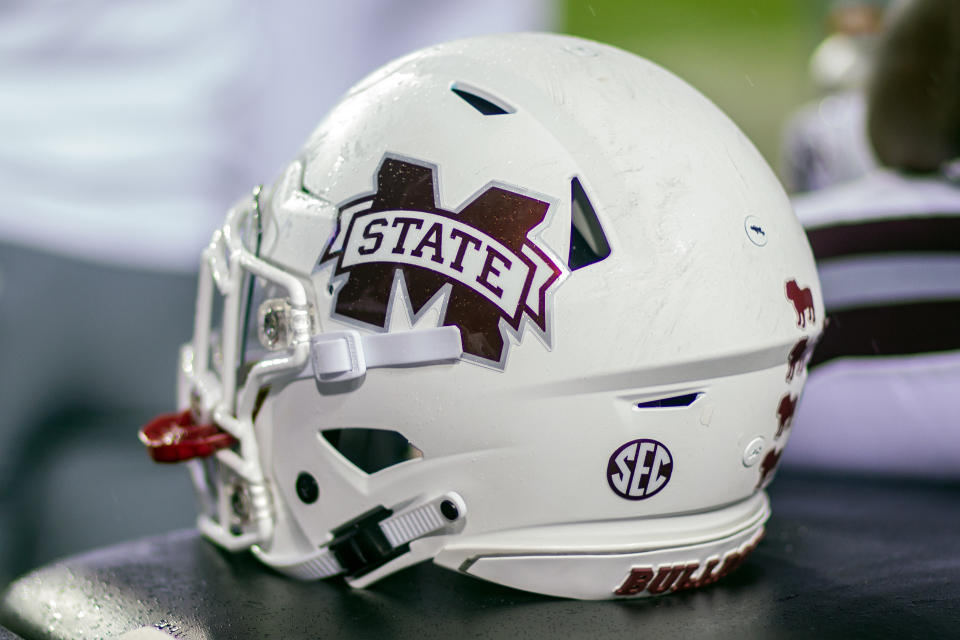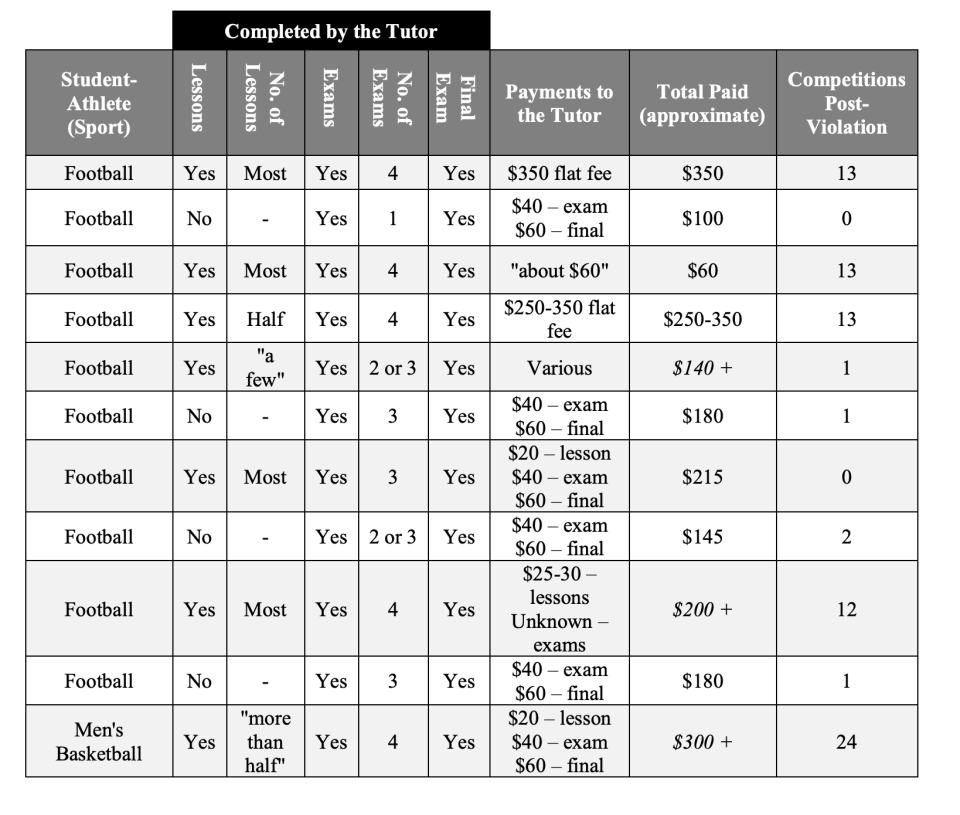Mississippi State hit with NCAA sanctions due to academic misconduct
Mississippi State was placed on three years NCAA probation Friday after it was found that a tutor committed academic misconduct in an online chemistry course for 10 football players and one men’s basketball player in exchange for cash.
According to a release, MSU and the NCAA agreed that the tutor “completed multiple assignments, exams and, in some instances, nearly the entire course” for the players. The school concluded that eight of the 10 football players competed while ineligible. The men’s basketball player did, too.
As a result, the two sides — after a “negotiated resolution” — agreed on an array of sanctions, which were approved by the NCAA’s Committee on Infractions.
In football, the program will face a scholarship reduction of two for the 2020-21 and 2021-22 academic years, a reduction of four official recruiting visits for 2019-20, a prohibition of unofficial recruiting visits for one game in each of the next three seasons and a reduction of recruiting evaluation days in fall 2019 (2) and spring 2020 (10).
[Join or create a 2019 Yahoo College Fantasy Football league for free today]
The basketball program will lose one scholarship for 2020-21 and two official visits for 2019-20 and 2020-21, be prohibited from hosting recruits on unofficial visits for two games in 2019-20 and 2020-21 and have a reduction of recruiting days for spring 2020.
The university will be forced to vacate records in which these student-athletes participated while ineligible. The school has also been fined $5,000.
The tutor was found to have committed academic misconduct and violated NCAA ethical conduct rules. She was given a 10-year show-cause order by the NCAA.
According to several outlets, the 10 football players — who have not been identified — will be suspended for eight games in 2019.

What happened?
The cheating was discovered after an academic advisor for MSU Athletics overheard a conversation between two players where one player told the other that a tutor would complete the chemistry course for a price. According to the NCAA, the player actually pointed to a tutor who was “seated nearby” and “suggested that the tutor could complete the course for him for a price.”
From there, the academic advisor reported what he heard to a colleague and the information was passed up the chain to MSU’s associate director of athletics and executive director of academics. The tutor was suspended and MSU’s compliance staff began investigating and, using IP addresses of student-athletes enrolled in the course, found evidence that suggested one person was completing the coursework.
The IP data showed that certain student-athletes' coursework and exams for the online chemistry course was completed, primarily, from two IP addresses: one on campus and one off-campus. The IP and timestamp data suggested that one individual logged into the student-athletes' online chemistry course accounts and completed exams and/or assignments for the men's basketball student-athlete and 10 football student-athletes, often in discernible, successive patterns. Based upon the IP information, an analysis of relevant dates, times and data showing that the tutor was logged in to the institution's system when course assignments or exams were completed, the institution believed the IP addresses traced back to the tutor.
The tutor, when meeting with school officials, denied any wrongdoing and refused to provide her IP addresses. She later “declined to participate” in MSU’s investigation, “sit for an NCAA interview” or “respond to additional requests for information.”
The men’s basketball player (reported to be Nick Weatherspoon) was the first MSU athlete interviewed. After initially denying any involvement, he admitted in a second interview (on Feb. 19, 2019) that the tutor offered to complete his work in exchange for cash. The following week, the 10 football players were interviewed and, per the NCAA, “all of them acknowledged that the tutor completed academic work on their behalf in exchange for cash payments.”
At that point, MSU concluded that all 11 student-athletes violated the institution's honor code. The players were all given an F in the course and were declared ineligible by the school. From there, the school began the process of getting the 11 players reinstated.
According to information provided by the players, the tutor was paid more than $2,000.

How does this case compare to Missouri’s NCAA case?
Back in January, Missouri was hit with a one-year postseason ban for very similar academic misconduct issues. A former tutor completed coursework for athletes across multiple sports, including several football players.
Missouri quickly fought back and appealed the ruling (a decision is expected in September), which school officials characterized as “overly harsh,” “unfair” and “unjust.” By comparison, the sanctions that Mississippi State received won’t make Missouri fans and officials feel better about that outcome.
Perhaps sensing that that comparison would be made, the NCAA noted that the Mississippi State case was processed through the “new negotiated resolution process,” which was used instead of a formal hearing because MSU and the NCAA enforcement staff “agreed on the violation and penalties.” Notably, the NCAA said that “negotiated resolutions may not be appealed” and “do not set case precedent for other infractions cases.”
In the negotiated resolution released by the NCAA, both sides agreed that “significant weight” should be given to MSU’s “prompt self-detection and self-disclosure; exemplary cooperation; affirmative steps to expedite final resolution of the matter; and prompt acknowledgement of the violations, acceptance of responsibility and imposition of meaningful corrective measures.” The sides also concluded that it was “not appropriate” to pin the tutor’s misconduct to the university.
The institution and enforcement staff also considered whether certain aggravating factors that applied to the tutor should also apply to the institution inasmuch as the tutor was, by definition, an institutional staff member. Both the facts of this case and prior case precedent suggest that it is not appropriate to apply all of the tutor's aggravating factors to the institution.
After the NCAA released news of the violations, Mississippi State released statements from both president Mark E. Keenum and athletic director John Cohen.
“Academic integrity is a core value at Mississippi State and that value guides our policies and decisions. Unfortunately, young people sometimes make poor decisions and those decisions have consequences,” Keenum said. “When the university learned of possible serious instances of academic misconduct involving student athletes and a student tutor employed part-time by MSU Athletic Academics, we were compelled to remove the student tutor from university employment, fully and independently investigate the matter, and then self-report the misconduct to the NCAA Committee on Infractions.”
Added Cohen: “Our staff at Mississippi State was proactive in our preventative measures, quick to respond, and worked in full cooperation with the NCAA enforcement staff. With all of the compliance training that our staff and student-athletes go through on a year-round basis, it is unfortunate that a student serving as a part-time tutor was able to lead our student-athletes astray. Nevertheless, we take full responsibility for these actions. Mississippi State will work diligently to continue a culture of compliance and continue to take proactive measures moving forward.”
More from Yahoo Sports:
